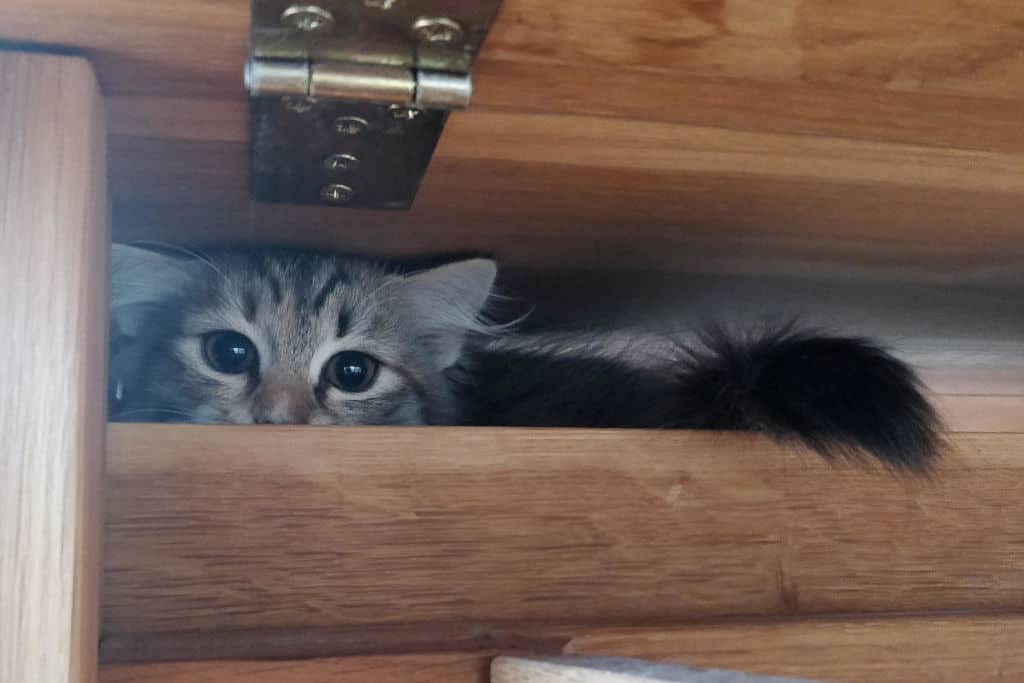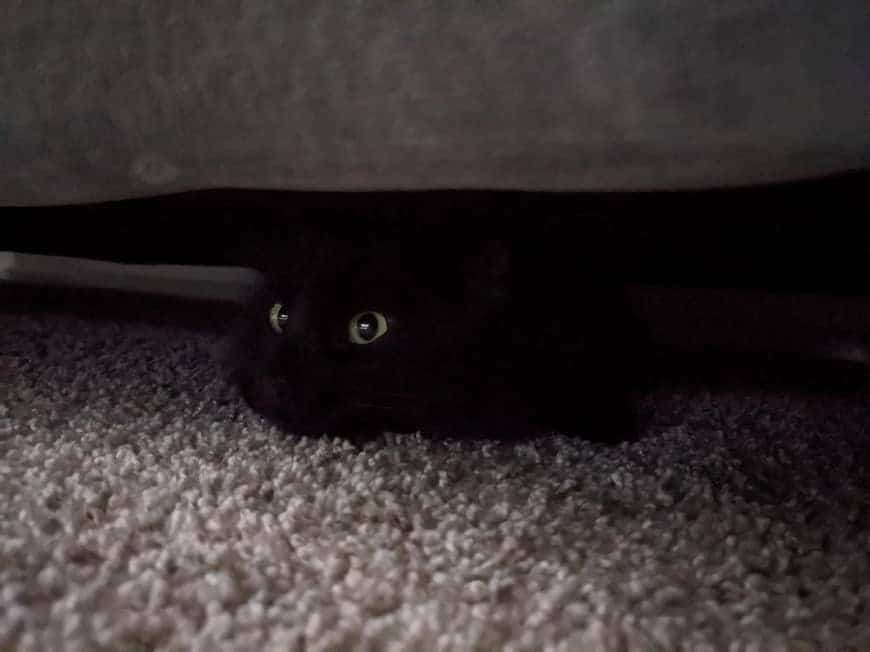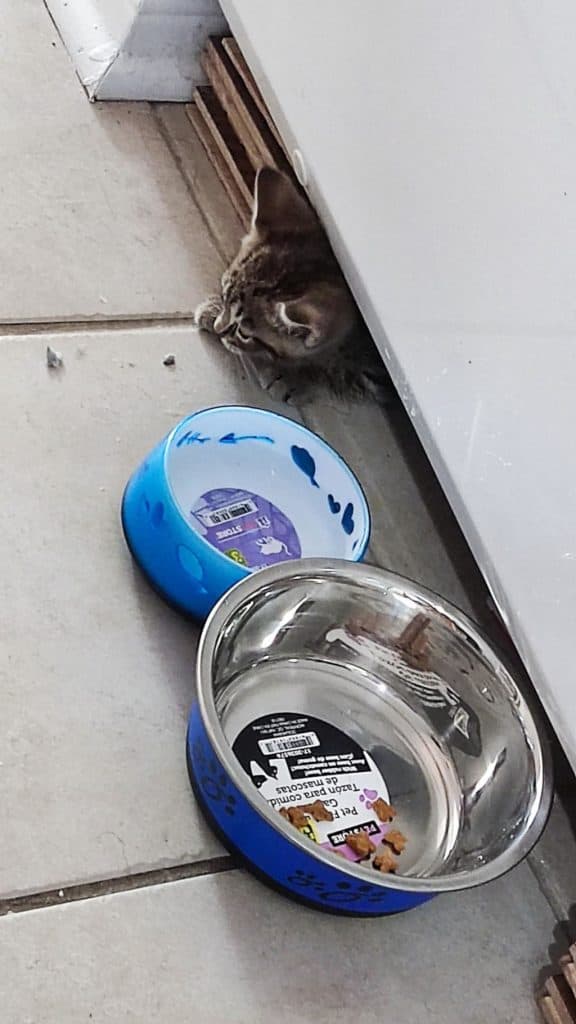Disclosure: We may earn a commission from helpful, relevant links in our content. No cost to you. See our privacy policy.
There are several reasons why a kitten may be hiding and meowing.
This article explores why kittens hide and meow, what to do in such cases, and how to get the kitten out of hiding.

Why Would Your Kitten Be Hiding and Meowing?
If you’ve recently adopted a kitten, it’s normal for them to hide for a few days or weeks and be very timid. This is quite normal.
When newly adopted kittens come to new homes alone, they are often terrified and confused. If the kitten doesn’t have a safe room or a place to hide, it might look for one so that it has a place to hide, at least temporarily. But there are many other reasons, and it’s not tied only to new kittens.
Here are some of the most common reasons for kittens to hide:
- Fear or Stress. Your kitten may be hiding because it feels scared or stressed. This could be due to loud noises, unfamiliar people or animals, or a change in its environment.
- Illness. If your kitten is meowing more than usual and hiding, it could be due to pain or discomfort caused by an illness.
- Hunger or Thirst. If your kitten is meowing loudly, it could be trying to get your attention because it’s hungry or thirsty.
- Litter Box Issues. If your kitten is hiding and meowing, it could also be because of a problem with its litter box, such as not being cleaned regularly or not being in a suitable location. Choose the right litter box and place them well so the kitten can use it properly.
- Attention Seeking. Sometimes, a kitten may hide and meow to get attention from its owners. If it feels neglected, it may resort to meowing and hiding to get the attention it needs.
- Lack of Stimulation. If your kitten is bored, it may hide and meow out of frustration. Ensure that your kitten has plenty of toys, playtime, and interaction to stimulate it mentally and physically.
- Territorial Issues. If other cats or animals are in the house, your kitten may hide and meow due to territorial issues.
- Separation Anxiety. If you recently started leaving your kitten alone for longer periods, it may develop separation anxiety, causing it to hide and meow.
If you’ve only adopted one kitten, remember that it is frightening because it has never been apart from its family. She’s been pulled away from her surroundings and doesn’t know which way is up, so she went to the ground in the first place, which appeared safe. She’ll come out eventually.
However, hiding could also be a sign of disease or injury. It is always preferable to visit a veterinarian for an accurate diagnosis and treatment strategy for your kitten’s behavior.

What to Do When a Kitten Is Hiding and Meowing?
Each kitten is unique, and the reason for its behavior may be different from another kitten’s. However, there is always something you can do to ensure the kitten’s safety, comfort, and proper health care.
If you get treats and foods that the kitten likes, it can assist in creating trust. Being in the room near where it’s hiding is a simple thing you can do. Try not to compel it to come out. Remain in the room and allow the kitten to become accustomed to your voice and scent.
The best thing you can do for a hiding kitten is to keep the kitten in the bathroom rather than the bedroom. There are fewer hiding places in bathrooms. You can regulate and monitor them while making them feel protected in this manner.
You can put a crate in the room as the kitten’s hiding spot. Place a container along as many walls as possible, then drape it with blankets to create a dark environment. Put food and drink in there, as well as a litter box just outside. Feed her goodies and speak sweetly to her to gain her trust.
Use Feliway plug-in pheromone diffusers. They emit a synthetic hormone that mimics the feline marking pheromone in their faces. Using these will assist the kitten in recognizing your location as “home” sooner.
Get one of those toys on a pole with a mouse or feathers. Playing with your cat is one of the best ways to bond with it. You will eventually find the kitten a lot more at ease in his surroundings, and you will be able to take larger steps.
If the kitten has been hiding for an extended period, ensure it has been eating and drinking water regularly. Otherwise, you’ll have to break in and pull her out.
It’s difficult to resist the need to adore and reach out to him. However, try to ignore it and be patient.

How Do You Get a Scared Cat Out of Hiding?
Provide food and treats
Food is the path to a kitten’s heart.
I’ve rescued some very wild kittens, and some of the best things you can do for the kitties is to bring them some yummy food and to sit and chat with them politely. They will get hungry and will eventually come out to investigate you.
Bring a tasty treat, such as canned cat food or tuna, to entice the kitten. If the kitten does not come out, leave it a can of cat food. This may help the cat associate you with pleasant memories, encouraging the kitten to come out of hiding.
Create a comfortable environment
Reduce stress triggers by minimizing exposure to loud noises and unfamiliar stimuli, and consider providing white noise and turning the lights off to help the kitten relax.
Offer vertical space
Another excellent idea is to provide her with vertical room to climb, such as a cat tree or shelves. She may venture out more now that she knows she can hide in different rooms and regions if she needs to.
Consider adopting a companion
Adopting one of the kitten’s siblings can provide her with a companion, making her feel more secure and less likely to hide. This will double the enjoyment and provide a companion for the cat.
Play kitten videos
If you need to urgently get the kitten out of hiding, you can try playing videos of meowing kittens, which may help entice her to come out. This video should work well:
Be patient and gentle
Don’t try to pull the kitten out of hiding. Instead, try to coax her out with treats or a toy. Keep a close eye on her to ensure she is responsive and alert, and if she doesn’t respond or appears unwell, take her to the nearest vet. If you’ve never been at one, here’s what to expect.
Seek professional help
If the kitten continues to hide or you suspect an underlying medical condition, it’s best to consult a veterinarian for a proper diagnosis and treatment. If the kitten is severely fearful or aggressive, consider seeking the help of a professional animal behaviorist.
Remember, each kitten is unique and may have different needs and preferences, so it’s essential to approach each situation with patience, understanding, and gentle kindness.
How Long Does a Scared Cat Stay Hidden?
The time the kitten stays hidden varies and depends on several factors, such as the severity of the stress trigger, the cat’s personality, and any underlying medical conditions. Some cats may hide for only a few hours, while others may stay hidden for days or weeks.
In some cases, a scared cat may hide permanently if the stress trigger is not addressed or if the cat develops a fear-based behavior issue.
If your cat is hiding and appears unresponsive or ill, it’s essential to seek veterinary care as soon as possible.
FAQs
How to tell if a kitten is traumatized?
A kitten may be traumatized if they display persistent signs of fear, anxiety, or avoidance behavior such as hiding, trembling, hissing, or losing appetite. The last thing you want is to scare the kitten further and develop trust issues. Observe the kitten’s behavior, and seek veterinary care to help the kitten heal.
How long does it take for a new kitten to bond with you?
The bonding process between a kitten and its owner can take several weeks to months and vary based on individual personalities and experiences.
Why would a cat sleep under a bed at night?
Cats may sleep under a bed at night for reasons such as seeking a dark and cozy hiding spot, feeling safe and secure, or because it is a familiar and comfortable place. Providing a comfy bed or blanket is vital for adequate rest and security.
Alex, a passionate animal lover, has experience in training and understanding animal behavior. As a proud pet parent to two dogs and three cats, he founded AnimalReport.net to share insights from animal experts and expand his knowledge of the animal kingdom.





